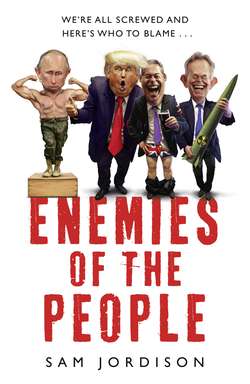Читать книгу Enemies of the People - Sam Jordison, Sam Jordison - Страница 12
ОглавлениеMel Gibson
Date of birth: 3 January 1956
In a nutshell: Hollywood actor caught saying bad things on tape – and espousing dodgy history on camera
Connected to: Jesus
‘The Jews are responsible for all the wars in the world. Are you a Jew? What do you think you’re looking at, sugar tits?’
So said Mel Gibson on the night of his arrest for drunk-driving in 2006. He has a bad habit of getting caught on tape. In 2010, he was also recorded in conversation with his ex-girlfriend Oksana Grigorieva:
‘You go out in public and it’s a fucking embarrassment to me. You look like a fucking bitch in heat, and if you get raped by a pack of niggers it’ll be your fault. All right? Because you provoked it. You are provocatively dressed all the time, with your fake boobs, you feel you have to show off in tight outfits and tight pants (garbled) you can see your pussy from behind …’
Later he was arrested for a misdemeanour battery on Oksana.
The staunchly Catholic actor and director’s long struggle with alcoholism and related mental-health issues might explain some of this behaviour – but Gibson has also been a malign influence when he’s sober. Here in the UK we can lay many of our problems directly at his feet. By his own admission, his 1995 film Braveheart has been one of the root causes of the populism that has swamped our island in recent years. ‘It certainly woke something up there in Scotland,’ said Gibson in a 2017 Press Association interview. And what it woke was anti-English nationalism.
The film is loosely based on the story of William Wallace, a thirteenth- to fourteenth-century aristocrat and briefly the leader of a war against King Edward I of England. ‘Loose’ in the sense of eight pints of lager and a hot balti working their way through your guts. Gibson (who also directed the film) smeared his face in woad, kilted up in clan tartan and portrayed Wallace as a principled and dedicated patriotic warrior, fond of bellowing lustily as he charges fearlessly into battle. This Wallace is also handy with slogans: ‘We can have what we never had before – a country of our own,’ he yells. No matter that Scotland had been independent for centuries when the real William Wallace led his murderous campaigns – and would remain so. No matter either that kilts were invented (in England) in the eighteenth century.* No matter that no one had put woad on their face for a good thousand years by the time Wallace was leading his murderous rampages.
On the subject of those campaigns, Mel Gibson himself acknowledged in a 2009 interview that the real Wallace was probably a ‘monster’, forever smelling of smoke because he was so fond of burning villages. Mel also – not unreasonably – said that he isn’t worried that his character was nothing like the real Wallace and that he may have ‘messed up’ the history. He was providing a cinematic experience, after all. But then, in the same interview he did go on to say ‘Films are there first to entertain, then teach, then inspire.’
So what was Braveheart teaching? What did it inspire? If you saw the long queues outside the cinemas in Scotland, and watched as grown men emerged after the film weeping, you’d get a fair idea. Also indicative was the fact that Scottish Nationalist Party activists were ready to greet the tearful crowds with leaflets bearing Gibson’s face and slogans like ‘independence isn’t just history’, ‘independence, we need it now more than ever’ and ‘today, it’s not just bravehearts who choose independence’. The SNP party leader at the time, Alex Salmond, also joked to a sword-wielding, kilt-wearing crowd at the annual Wallace rally that he would remove the head of the Scottish Secretary Michael Forsyth during the intermission at the film’s premiere.
In the years since that recruitment drive, the SNP have been careful to give a veneer of respectability to their separatism, claiming that their brand of nationalism is more inclusive and less xenophobic than all the other nationalisms around the world. They imply without noticeable irony that they are better, because they are Scottish.
In spite of such rationalisations, Braveheart still opened the stopper on a poison that has leached into every aspect of British life. It set a tone with its outrageous distortions of reality tied to sentimental flag-waving and outright racism. It helped inspire a resurgence in SNP fortunes and so brought us the misery of the 2014 Scottish Independence Referendum. There it was shown that millions of votes could be won thanks to transparently nonsensical promises about the bonanza that would come from future oil wealth and angry talk about traitors and quislings. That in turn inspired the Leave campaign’s combination of foreigner-bashing and lying promises about giving money to the NHS. Not to mention the fact that by defining themselves against the English, the Scottish Nationalists made the English think about themselves as a separate entity too.
‘I like to stay out of the politics of other people’s nations so I won’t go further,’ said Mel back in 2009. Which is fine. Having massively distorted history, and helped contribute to decades of ill-feeling, he’s decided not to interfere. Let’s try not to imagine the mess he’d make if he did …
* The ‘traditional’ kilt was introduced to Scotland by an Englishman called Thomas Rawlinson in the eighteenth century. Rawlinson, had noticed that the authentic Highland dress worn by his employees north of the border was ‘a cumbrous unwieldy habit’ so he got the tailor from the local (English) army regiment to design something more suitable. The tailor came up with the kilt design and the rest is history – but maybe not history as Scottish nationalist kilt wearers would have it.
